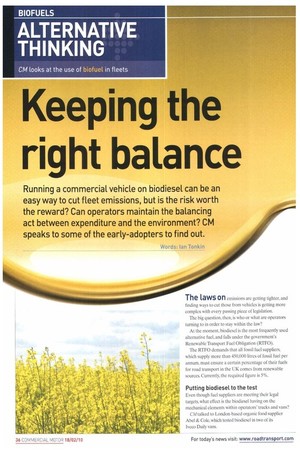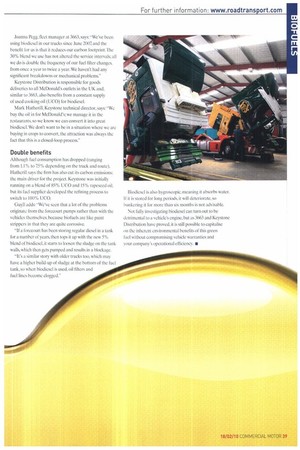Running a commercial vehicle on biodiesel can be an easy
Page 36

Page 37

Page 39

If you've noticed an error in this article please click here to report it so we can fix it.
way to cut fleet emissions, but is the risk worth the reward? Can operators maintain the balancing act between expenditure and the environment? CM speaks to some of the early-adopters to find out.
Words: Ian Tonkin The laws on emissions are getting tighter, and finding ways to cut those from vehicles is getting more complex with every passing piece of legislation.
The big question, then, is who or what are operators turning to in order to stay within the law?
At the moment, biodiesel is the most frequently used alternative fuel, and falls under the government's Renewable Transport Fuel Obligation (RTFO).
The RTFO demands that all fossil fuel suppliers. which supply more than 450,000 litres of fossil fuel per annum, must ensure a certain percentage of their fuels for road transport in the UK comes from renewable sources. Currently, the required figure is 5%.
Putting biodiesel to the test
Even though fuel suppliers are meeting their legal targets, what effect is the biodiesel having on the mechanical elements within operators' trucks and vans?
CM talked to London-based organic food supplier Abel & Cole, which tested biodiesel in two of its Iveco Daily vans Nick Cannell, transport manager at Abel & Cole, says: "We found the oil was degrading quickly over the trial period, resulting in regular draining and replacing," The firm had both its Daily vans converted to run on biodiesel made from plant oil by Regenetee, but after just 7,000 miles. the vehicles began to develop serious mechanical complications.
Cannel adds: -We then had the engines blow on us, which were replaced by Regenetec. The third time we were wise to [the probleml when we saw a massive degradation in oil, so we pulled the engine apart and found it was about to go again.
"After staff examined the engine, they found a large build-up of polymers on the injector tips, which subsequently prevented the injectors from closing properly. Overnight, biodiesel would then seep through the openings and start to contaminate the engine oil."
Cannell continues: "Once contaminated, it took very little running before the internal bearings of the engine started to break down.
Warehouse and distribution firm Lloyd Fraser Group is another operator that has yet to be convinced about biofuels. It conducted a six-week trail of biocliesel made from recycled chip fat. John Mellors, contract fleet manager for Lloyd Fraser, says: "The fuel [biodiesel] has not proved a hit. The calorific level is slightly lower than diesel, and we have seen a slight reduction in economy by 5%, which negates any other benefits [of using it].
There are several operators, however, that are finding biofuels beneficial to their operation -3663 First for Foodservice and Keystone Distribution. )))
Joanna Pegg, fleet manager at 3663, says:"We've been using biodiesel in our trucks since June 2007, and the benefit for us is that it reduces our carbon footprint.The 30% blend we use has not altered the service intervals; all we do is double the frequency of our fuel filter changes. from once a year to twice a year. We haven't had any significant breakdowns or mechanical problems."
Keystone Distribution is responsible for goods deliveries to all McDonald's outlets in the UK and, similar to 3663, also benefits from a constant supply of used cooking oil (UCO) for biodiesel.
Mark Hatherill, Keystone technical director, says: "We buy the oil in for McDonald's; we manage it in the restaurants, so we know we can convert it into great biodiesel. We don't want to be in a situation where we are buying in crops to convert, the attraction was always the fact that this is a closed-loop process."
Double benefits
Although fuel consumption has dropped (ranging from 1.1% to 7.5% depending on the truck and route). Hatherill says the firm has also cut its carbon emissions; the main driver for the project Keystone was initially running on a blend of 85% UCO and 15% rapeseed oil, but us fuel supplier developed the refining process to switch to 100% UCO.
Guyll adds: "We've seen that a lot of the problems originate from the forecourt pumps rather than with the vehicles themselves, because biofuels are like paint strippers in that they are quite corrosive.
"If a forecourt has been storing regular diesel in a tank for a number of years, then tops it up with the new 5% blend of biodicsel, it starts to loosen the sludge on the tank walls, which then gets pumped and results in a blockage.
"It's a similar story with older trucks too, which may have a higher build-up of sludge at the bottom of the fuel tank, so when biodicsel is used, oil filters and fuel lines become clogged." Biodiesel is also hygroscopic, meaning it absorbs water. If it is stored for long periods, it will deteriorate, so bunkering it for more than six months is not advisable.
Not fully investigating biodiesel can tw..n out to be detrimental to a vehicle's engine, but as 3663 and Keystone Distribution have proved. it is still possible to capitalise on the inherent environmental benefits of this green fuel without compromising vehicle warranties and your company's operational efficiency. •
































































































































